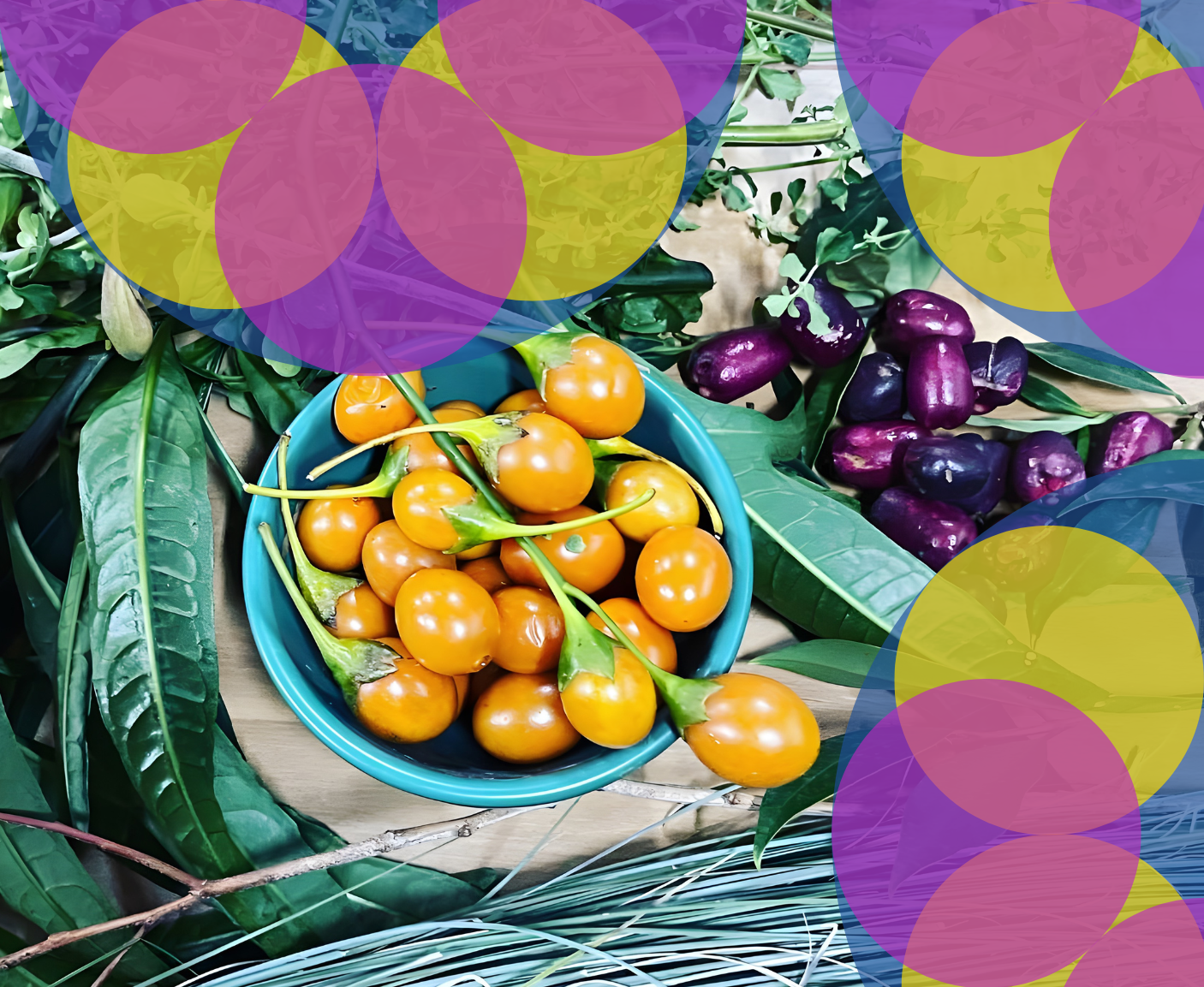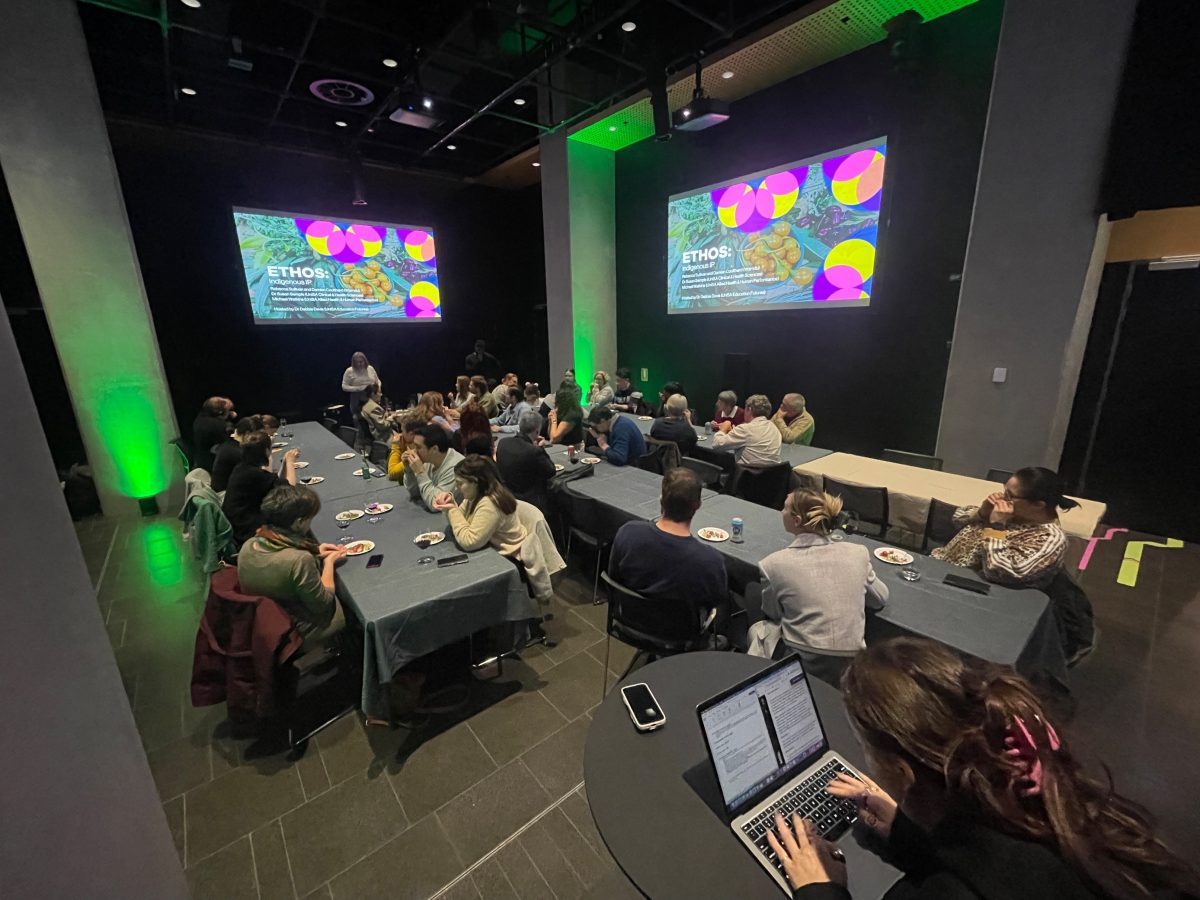Posted 31 May

The unbe-leaf-able reality of Indigenous native foods and how this affects past, present, and emerging Indigenous intellectual property rights.
It is the 1960’s. A Kangaroo Apple is seen growing on a shrub. Before reaching full ripeness, an Indigenous Woman is seen picking said Kangaroo Apple, and consumes it. A non-Indigenous man watches on, intrigued. This fruit stops pregnancy. Extracts from Kangaroo Apple are one of the ingredients of the contraceptive pill. This Indigenous Cultural and Intellectual Property was given, sold, and monetised for mass-profit internationally – and not by Indigenous Australians.
Rebecca Sullivan and Damien Coulthard of Warndu explored these stories and contentious issues over a native food tasting evening at the 23 May 2024 Ethos Event at MOD., entitled ‘Indigenous IP’. This multisensory and multi-disciplinary discussion also heard from Michael Watkins and Dr Susan Semple, who dissected the key issues around the use of traditional knowledges. Dr Debbie Devis facilitated the evening, and captured audience views on the protection of traditional Indigenous arts, culture, and knowledge.

Warndu means ‘good’ in the Adnyamathanha language. And ‘good’ is exactly what Rebecca Sullivan and Damien Coulthard are doing with their Indigenous owned company that they describe as being the ‘Australian native food revolution’. Rebecca and Damien passed a tasting plate to each of the 35 Ethos guests, featuring an array of native plants, nuts, seeds, and proteins – as well as stories that packed a punch. Rebecca and Damien shared Warndu native food truths that ignited enthusiasm throughout the event:
Although these native plants carry unique medicinal and flavoursome peculiarities, there is something more prevalent that binds these native foods together. It’s the rich Indigenous culture and intellectual property that coincides – but legally, is lacking.

Panellists emphasised the need for respectful collaboration and cultural understanding when working with Indigenous communities. Indigenous-originating ideas and practices in research and commercialisation are emphasised by Dr Susan Semple as requiring inclusive approaches – specifically by involving Indigenous communities in decision-making processes to ensure that their voices are heard.
Michael Watkins discussed ethical considerations in the native food industry, particularly when working with Indigenous communities, and the need for a joint plan that integrates ethics and cultural heritage – with major stress being placed on the importance of protecting traditional knowledge and culture in the face of biotechnology. Watkins and Semple’s experiences found that having allies of non-Indigenous staff in universities is imperative to help share the real experiences of Indigenous Australians.
Empathy must be evoked from both Indigenous and non-Indigenous workers, as non-Indigenous workers may be the future of certain workplaces, and they must be aware of the traditional arts, culture and knowledge that pre-exist. It was suggested that collaboration with Elders may be an effective way to ensure that Indigenous voices are embedded into the curriculum and in graduate outcomes.

The issues in Indigenous Intellectual Property (‘IP’) are as clear as day. How can we ensure that we are taking positive steps to protecting IP and ensuring Indigenous food sovereignty moving forward? Consumers need to make informed purchasing decisions, and can do this by authenticating native food products. Consumers could benefit from an overarching recognition system to identify high-quality native products that support local farmers. Indigenous communities must be effectively engaged for longstanding agreements with watertight terms, shared benefits, and cultural sensitivity to be achieved.
A fervent legal conversation also erupted amongst guests over Queensland’s Biodiscovery Act 2004. In Queensland, custodians’ agreement is required for any native biological material collected and positioned in the public domain anywhere in Queensland. Currently, Queensland is leading, but alone, in recognising the origins and maintaining the respect of traditional arts, culture and knowledge. Indigenous knowledge and traditional knowledge are not recognised by copyright laws – yet panellists asked, “Even if something is engrained in law, does it mean that the law won’t be broken?”
Guest conversation also considered how expansion of IP law must be crafted in such a way to protect Indigenous communities not just individuals. These issues may better be addressed by expanding public education on these very real and overtly present issues. The more people know, the more accepted it will become.
People universally agree that food brings us together. Food is a safe space for people. Food creates an environment where people can engage in culture in a way that is exciting, proud, and informative. Among many other things, that is what this Ethos event at MOD. achieved.
Like Warndu showed its Ethos guests, there is an obligation that we have to act within the job we do. We must act with purpose. This Ethos event reiterated the need to celebrate identities and Indigenous and non-Indigenous businesses. Indigenous IP is about making sure we are acting in culturally sensitive and conscious ways. We have a responsibility to acknowledge and reference originating stories in a way that must be specific and thoughtful. Only then, we can start to move forward not only as an industry, but also as a country.
Want to delve deeper?
Ethos is made possible with funding through the Deputy Vice Chancellor of Research and Enterprise. We hold Ethos events regularly at MOD., you can find more details here.
Author: Isabella Candeloro was the rapporteur for this event and is a Moderator at MOD.